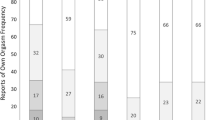Abstract
Based upon field research conducted in China in the 1990s and 2000s, this article examines older Chinese women’s views and practices surrounding sexual interaction in later life. In contrast to local clinical depictions of middle-aged and elderly Chinese women as repressed by feudal superstitions concerning sex in later life, this research shows that more middle-aged and elderly Chinese women are sexually active than such clinical sources assume. Furthermore, there is no neat correspondence between sexual attitudes and sexual activity, and Chinese women’s attitudes concerning later life sex are often much more liberal than their behavior. Absence of sexual activity among older Chinese women is more closely related to problems in the marital relationship in general and/or to health problems than it is to attitudes about age and sex. At the same time, many Chinese women challenge the claims of western sexology that presume the marital relationship and sexual interaction to be a top necessity for a good quality of life in the later years. These findings have important implications for public health education, clinical training, and health and social service delivery in China.
Similar content being viewed by others
Notes
These Chinese clinical health education books are written in Chinese characters, an ideographic form of writing that is understood all across the nation of China, despite its many spoken dialects.
Chinese names are written surname first, followed by personal name, such as Xu Rongzhou.
Guan’s article shows that in his rural Henan study, 78.9% of the sample was married, and 78.9% of the sample had their own bedroom. He does not explicitly say that all of the married couples had their own bedroom, but it seems like so much of a coincidence that the percentage would be precisely the same, that either this is the case or perhaps the second figure is a typo.
Xu (1997) suspects that abuse of wives by husbands and mothers-in-law is based first in patriarchal, patrilineal, patrilocal Confucian culture that treated incoming wives as inferiors meant to serve their husbands and mothers-in-law by bearing sons and doing housework. Xu also suspects that the dehumanizing violence of the Cultural Revolution added another layer of brutality to domestic life. In analyzing survey data from Chengdu in Sichuan Province from prior to 1988 (N = 586), she found that about 13% of the sample of women said that their husband had kicked, hit, or beat them in the past decade.
References
Bengston, V. L., Gans, D., Putney, N. M., & Silverstein, M. (Eds.). (2009). Handbook of theories of aging (2nd ed.). New York: Springer.
Bourdieu, P. (1977). Outline of a theory of practice. Cambridge: Cambridge University Press.
Evans, H. (1997). Women and sexuality in China: Female sexuality and gender since 1949. New York: Continuum.
Guan, J. (2004). Correlates of spouse relationship with sexual attitude, interest, and activity among Chinese elderly. Sexuality and Culture, 8(1), 104–131.
Hooyman, N. R., & Kiyak, H. A. (2011). Social gerontology: a multidisciplinary perspective (9th ed.). New York: Allyn and Bacon/Pearson.
Jeffreys, E. (2006). Sex and sexuality in China. New York: Routledge.
Lindau, S. T., Schumm, L. P., Laumann, E. O., Levinson, W., O’Muircheartaigh, C. A., & Waite, L. J. (2007). A study of sexuality and health among older adults in the United States. The New England Journal of Medicine, 357, 762–74.
Liu, D., et al. (1992). Laonianren de Xing Shenghuo (Elderly People’s Sex Life). In D. Liu (Ed.), Zhongguo Dangdai Xing Wenhua (Sex Culture in Modern China). Shanghai: Shanghai Sanlian Shudian.
Pan, S. (1993). China: acceptability and effect of three kinds of sexual publication, Archives of Sexual Behavior, 22, 59–71.
Qian, X., & Yang, W. (1990). Laonian Xing Wenti Zixun (Information on Sexual Issues in Old Age). Beijing: Kexue Chubanshe.
Qin, Y., & Hong, Y. (1999). Lao Shang Fengliu Shi Shouzheng: Yu Zhonglaonian Pengyou Tan Xing (Old and still romantic is a sign of longevity: Talking about sex with our middle-aged and old friends). Beijing: Zhongguo Shehui Chubanshe.
Shea, J. L. (2005). Sexual liberation and the older woman in contemporary mainland China. Modern China, 31(1), 115–47.
Sokolovsky, J. (Ed.). (2009). The cultural context of aging: Worldwide perspectives. Westport: Praeger.
Sun, S. (2008). Zhonglaonian Xing Baojian (sexual health maintenance in middle and old age). Beijing: Jindu Chuban She.
U.S. Census Bureau, Country Files: China, Population Pyramid, International Population Database, http://www.census.gov/ipc/www/idb/country.php. and http://www.census.gov/cgi-bin/broker, accessed January 31, 2011.
Xu, X. (1997). The prevalence and determination of wife abuse in urban China. Journal of Comparative Family Studies, 280–303.
Xu, R., & Cao, Q. (2008). Laonian Ren Jingshen Shenghuo Jiankang Zhinan (guide to a healthy psychological life among elderly persons) (pp. 301–16). Zhongguo Yiyao Keji Chuban She: Beijing.
Zhou, D., & Niu, B. (2000). Zhonglaonian Xing Zhishi Baiwen (one hundred questions and answers about sex in middle and old age). Shanghai: Shanghai Zhongyiyao Daxue Chubanshe.
Acknowledgements
This research was supported by the National Institute of Mental Health Predoctoral Award, the National Science Foundation Graduate Fellowship, the Committee on Scholarly Communication with China Graduate Fellowship, the Cora DuBois Dissertation Fellowship, the Dean's Fund Award for Faculty Research of the University of Vermont (UVM), and the Asian Studies Faculty Research Award funded through grants to UVM from the Freeman Foundation, the Parimitas Foundation, and the Lintilac Foundation.
Author information
Authors and Affiliations
Corresponding author
Rights and permissions
About this article
Cite this article
Shea, J.L. Older Women, Marital Relationships, and Sexuality in China. Ageing Int 36, 361–377 (2011). https://doi.org/10.1007/s12126-011-9114-3
Published:
Issue Date:
DOI: https://doi.org/10.1007/s12126-011-9114-3



